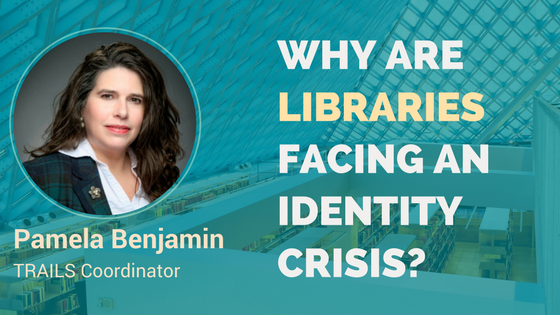There has been a lot of discussion over the past years about libraries facing an identity crisis. From budget cuts, technology advances to changing needs of the community, libraries are in a transformative state that some see as an identity crisis. To find out more about the context in which libraries may be facing an identity crisis, we’ve had a chat with Pamela Benjamin, TRAILS Coordinator at Montana State University Library. Check out her thoughts below!
From budget cuts, #technology advances to changing needs of the #community, #libraries are in a transformative state that some see as an identity crisis. Share on XWhy an Identity Crisis?
When thinking about the collective identity crises librarians have been enduring, no matter how you spin it, from Mogens Vestergaard’s shifting from a transactional to relational library or Jan Holmquist’s need for meaningful face-to-face interactions, we’re all saying the same thing – it’s about the people. We are defined by the people and people’s needs are changing! This is not a shocking revelation and it seems obvious to all.
There are 4 predominant themes that run throughout the #libraryworld: #technology, space, information/content and people. We can play with the first three, but the last one is our core. #librarians #libraries Share on XYet, it seems to get mired among the four predominant themes that run throughout the library world: technology, space, information/content and people. We can play with the first three, but the last one is our core.
Final Frontiers – Technology & Space?
Get on the high-speed, bullet train or get left behind. The digital divide is real and I agree with Liz McGettigan when she says that libraries should be one-stop destinations for learning all things digital. However, it does not need to be the main focus unless it is a good fit for that library’s community. Some places may have the right combination of demographics and interest so that the latest tech wonders are worth the investment. On the other side of the digital divide track, some users will benefit most from introductory training on the most basic of tech products.
#Libraries the perfect union of #technology and space usage - #makerspaces. Share on XThen there is the perfect union of technology and space usage – makerspaces. There are some great programs going on that tie in local industry and job skills or creativity and science. In many cases, makerspaces may be promoting science but the appeal is for an already tech-savvy crowd who have other options.
There are other significant uses for library space involving collaborative functions or community hub facilitation. These are all wonderful and spot on as they highlight that we make spaces fit people, not the other way around.
Thanks to @BensonTeacher for giving me a tour of the PHS library makerspace in Fort Collins. I love what they are doing @poudremedia! I can’t wait for the new makerspace in the library @BroomfieldHigh! @BVSDEdTech @BVSDInnovation pic.twitter.com/7HJwLpJJx2
— Jane Schissel (@LibSchissel) May 3, 2018
A Smile & Information
It may be agreed that technology and space are mercurial, but I can hear you say – “How can you state that information is anything less than core to our profession?”
A reference experience is actually deemed successful not in accordance to accuracy, but rather the #librarian’s enthusiasm, friendliness, and interest. #libraries Share on XPerhaps it is controversial to say that information, especially accurate information, is not at the heart of librarianship. Nonetheless, there was some famous research in 1995 (and others) that looked at the patron’s perspective (which is what we really care about, right?) related to the accuracy of the information provided by reference librarians. Surprisingly, the study found that a reference experience is actually deemed successful not in accordance to accuracy, but rather the librarian’s enthusiasm, friendliness, and interest.
Trust & Empathy
Okay, so where does all the above leave us? Back to people. You say, “We already put people first and always have.” True – to an extent. Maybe, however, it’s time we move out of our collective comfort zones and change how we put users first while capitalizing on our strengths.
It’s time we move out of our collective comfort zones and change how we put users first while capitalizing on our strengths. #librarylife #librarycrisis Share on XLibrarians are trusted. More than government officials, more than journalists, more than businesses, and more than academics. We aren’t there to get votes, sway opinions, sell something, or grade papers. Librarians try to provide information in a neutral, non-judgmental way purely for the reward of assisting someone. This is key. What we see as doing our job, users perceive as help for no gain. Help for no gain can be seen as empathy. We do what we do because we love people, love knowledge, and want to bring them together. No matter how things change, people will always want, make that need, to trust someone and feel cared about.
#Trustedprofessional public poll results in @bmj_latest https://t.co/tQYYGesaQE. Medical staff seen as most likely professionals to provide trustworthy information with librarians in the top 5. #BMJ https://t.co/jqxIFXILET pic.twitter.com/4VKbXRcAGh
— CILIP (@CILIPinfo) February 23, 2018
Public Libraries – how can libraries transform?
The 5th Branch
Some library leaders have gone as far as to suggest that libraries become the fifth branch of government. I understand Sten Bording Andersen’s point that we have a role to play, but it should be in an advisory capacity rather than a governing one. Providing advice goes beyond supplying information, but it is not out of the bounds of reason. Yet this is pushing the envelope for librarians.
We’re used to the role of information gatekeeper, not information concierge. It is a form of power, but I believe it would be well placed in librarians as their ethics and love of truth would keep things in check.
Take on social services
In addition to providing counsel to government officials, librarians could – and should – take on those social services – loudly and proudly – which governments are increasingly backing away from. If a service is too specialized or too much in the realm of social services, then contract with an expert. For instance:
– Work with legal aid to offer basic assistance.
– Work with medical clinics to offer initial tier medical help.
– Work with daycare providers to offer childcare as an official service (instead of serving as ersatz babysitters without any recognition of value).
– Work with homeless centers to offer warming centers or other services. (Again, many libraries already do this in an unofficial capacity. Why not get more “credit” for it?)
Yes, I know, “We didn’t go to school to be social workers.” Maybe not, but to stay relevant, take a tip from the business world and go where the need is. Let’s truly embrace being the social and cultural center of the community by broadening roles.
Need help sorting your problems? Citizen Advice Portsmouth provide an information service in the Central Library https://t.co/QR6l8mTszp pic.twitter.com/XIwAd4EqpO
— Portsmouth Together (@Pmouth_Together) August 30, 2017
Tackle loneliness and dividedness
Loneliness is a huge, cultural problem that knows no boundaries.
– Offer purely, get-to-know-you programs to create opportunities for different generations, ethnicities, social classes, etc. to interface.
– Help the lovelorn. Yes, I’m suggesting offering mix and mingle events at the library for those not wishing to find love at clubs or online.
Political dividedness is becoming part of the cultural fabric in countries around the globe. Libraries, as bastions of democracy, should routinely provide safe, neutral opportunities for the civil, political exchange of ideas.
#Libraries, as bastions of democracy, should routinely provide safe, neutral opportunities for the civil, political exchange of ideas. Share on X“Sherpa”dize the information
Pull back the curtains and bust the myths. Fake news, fake videos, fake whatever – we debunk it with our knowledge of authoritative sources and technological know-how. As poser techniques, phishing, scamming, and falseness become de rigueur, librarians need to proudly market themselves as the Ultimate Truthsayers or Information Sherpas that can lead people through the mountains of falsehoods.
#Fakenews, fake videos, fake whatever – we debunk it with our knowledge of authoritative sources and technological know-how. #librarians Share on XIt’s now all about the data. For years libraries have cared more about people’s privacy rights than the people have. As the general public’s tipping point shifts from “Yay for convenience!” to “Holy crap! What do they know about me?!”, librarians will finally be in-step with their communities. The worm is turning, and librarians need to place themselves in the front and center.
Mine, not mined? What might the concept of #dataownership mean for #libraries and their users? New blog from IFLA for #ChoosePrivacy week: https://t.co/Qof18B1sk9 #privacy @privacyala #dataprotection #GDPR @IFLA_FAIFE pic.twitter.com/pxPlFrkWFm
— IFLA (@IFLA) May 2, 2018
Bring in the Lawyers, Bring in the Religion
I realize that some of the above ideas have legal or other challenges. Anything of substance, should. Looking further down the road, sophisticated search algorithms and AI will remove the need for the basic finding skills, making the so-called soft skills even more important. Daring to touch the 3rd rails of librarianship’s will not be easy. Extended social services and information concierge are not officially recognized as tenets of the library profession. Nevertheless, these options may not be just options but rather the necessary dogma that is the salvation for us and for those we serve.
Did you enjoy reading Pamela’s thoughts? Follow us on Twitter and let us know what you think about the librarian’s identity crisis. In case you want to have a chat with Pamela, you can get in touch with her by e-mail here. We will be back next week with another interesting article from the library world!
Recent posts
Enhancing User Experience For Libraries In The Digital Age
In this week's Princh Library Blog post, recurring guest writer Sam L. Bowman covers how your library can improve the user experience on [...]
Library Password Practices—Balancing Accessibility and Security
In this week's Princh Library Blog, recurring guest writer Nina Grant discusses a basic, but nevertheless crucial digital security principle: secure password [...]




I agree with this woman’s observations & ideas. I am a retired public librarian. The library is truly, obviously the last public space for information, interactions with others (face to face), learning experiences via classes. …Places where any adult or child can come and read bks, newspapers, magazines for free. An educated populace is critical to maintain our democracy.
Hi C Lewis,
It’s nice to hear that you that these concepts have appeal to someone who has had so much experience in the public library realm. It does feel like libraries are the last bastion of democracy when you have so much false information and the means for separating truths from fiction is getting increasingly difficult. Not to mention, the incredibly divisive political environment, the attacks on the Fourth Estate, the growing sophistication of algorithms, and the general mood of anti-intellectualism.
Libraries have a lot of work to do.